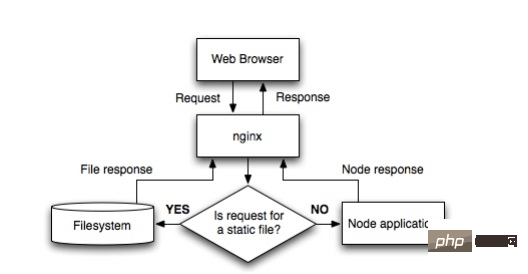Flowchart

nginx 구성은 다음과 같습니다.
http {
proxy_cache_path /var/cache/nginx levels=1:2 keys_zone=one:8m max_size=3000m inactive=600m;
proxy_temp_path /var/tmp;
include mime.types;
default_type application/octet-stream;
sendfile on;
keepalive_timeout 65;
gzip on;
gzip_comp_level 6;
gzip_vary on;
gzip_min_length 1000;
gzip_proxied any;
gzip_types text/plain text/html text/css application/json application/x-javascript text/xml application/xml application/xml+rss text/javascript;
gzip_buffers 16 8k;
ssl_certificate /some/location/sillyfacesociety.com.bundle.crt;
ssl_certificate_key /some/location/sillyfacesociety.com.key;
ssl_protocols sslv3 tlsv1;
ssl_ciphers high:!anull:!md5;
upstream silly_face_society_upstream {
server 127.0.0.1:61337;
server 127.0.0.1:61338;
keepalive 64;
}
server {
listen 80;
listen 443 ssl;
server_name sillyfacesociety.com;
return 301 $scheme://www.sillyfacesociety.com$request_uri;
}
server {
listen 80;
listen 443 ssl;
server_name www.sillyfacesociety.com;
error_page 502 /errors/502.html;
location ~ ^/(images/|img/|javascript/|js/|css/|stylesheets/|flash/|media/|static/|robots.txt|humans.txt|favicon.ico) {
root /usr/local/silly_face_society/node/public;
access_log off;
expires max;
}
location /errors {
internal;
alias /usr/local/silly_face_society/node/public/errors;
}
location / {
proxy_redirect off;
proxy_set_header x-real-ip $remote_addr;
proxy_set_header x-forwarded-for $proxy_add_x_forwarded_for;
proxy_set_header x-forwarded-proto $scheme;
proxy_set_header host $http_host;
proxy_set_header x-nginx-proxy true;
proxy_set_header connection "";
proxy_http_version 1.1;
proxy_cache one;
proxy_cache_key sfs$request_uri$scheme;
proxy_pass http://silly_face_society_upstream;
}
}
}구성 섹션 설명
http {
...
upstream silly_face_society_upstream {
server 127.0.0.1:61337;
server 127.0.0.1:61338;
keepalive 64;
}
...
}nginx는 여러 nodo.js 인스턴스의 부하를 분산합니다. keepalive 64는 nginx에게 언제든지 프록시 서버에 대한 최소 64개의 http/1.1 연결을 유지하도록 지시합니다. 트래픽이 더 많으면 nginx는 더 많은 연결을 엽니다.
http {
...
server {
...
location / {
proxy_redirect off;
proxy_set_header x-real-ip $remote_addr;
proxy_set_header x-forwarded-for $proxy_add_x_forwarded_for;
proxy_set_header host $http_host;
proxy_set_header x-nginx-proxy true;
...
proxy_set_header connection "";
proxy_http_version 1.1;
proxy_pass http://silly_face_society_upstream;
}
...
}
} 일치하는 요청을 프록시에 보냅니다. nginx의 일치 규칙에 대해서는 이전 기사를 읽을 수 있습니다.
nginx는 정적 콘텐츠를 처리합니다
http {
...
server {
...
location ~ ^/(images/|img/|javascript/|js/|css/|stylesheets/|flash/|media/|static/|robots.txt|humans.txt|favicon.ico) {
root /usr/local/silly_face_society/node/public;
access_log off;
expires max;
}
...
}
}캐시 설정
http {
...
proxy_cache_path /var/cache/nginx levels=1:2 keys_zone=one:8m max_size=3000m inactive=600m;
proxy_temp_path /var/tmp;
...
}
http {
server {
...
location / {
...
proxy_cache one;
proxy_cache_key sfs$request_uri$scheme;
...
}
...
}
}캐시는 http 헤더를 통해 제어됩니다.
helloworld
한번 시도해 보겠습니다. helloworld.js
var http = require('http');
http.createserver(function (request, response) {
response.writehead(200, {'content-type': 'text/plain'});
response.end('hello world\n');
}).listen(61337);
console.log('server running at http://127.0.0.1:61337/');를 작성하고 node helloworld.js 명령을 사용하여 열어보겠습니다. 이렇게 하면 로컬 머신에서 실행 중인 nodejs 프로그램이 열리고 차지하게 됩니다. 포트 8000. 직접 수정할 수 있습니다.
이 시점에서 nginx의 vhost.conf 설정이 다음과 같아야 합니다:
server {
listen 80;
server_name jb51.net.jb51.net;
location / {
proxy_pass http://127.0.0.1:61337;
}
}웹사이트 도메인 이름을 설정한 다음 포트를 80으로 설정하고 마지막으로 Proxy_pass를 http://127.0.0.1:61337로 설정합니다. , 그리고 jb51.net:80의 요청이 nodejs 프로그램으로 전달됩니다.
nginx를 다시 시작하고 도메인 이름에 액세스하면 helloworld를 볼 수 있습니다.
node.js 자체가 서버로 사용될 수 있는 것은 사실이지만, 예를 들어 Welcome.js에 포트 80을 설정하면 됩니다.
그러나 하나의 기계가 여러 웹사이트를 운영하고 다른 웹사이트는 다른 서버를 사용합니다. 포트 80이 이미 사용 중이면 다른 포트로 프록시를 통해 처리될 수 있습니다.
위 내용은 Nginx 서버를 사용하도록 Node.js를 구성하는 방법의 상세 내용입니다. 자세한 내용은 PHP 중국어 웹사이트의 기타 관련 기사를 참조하세요!